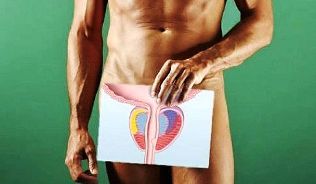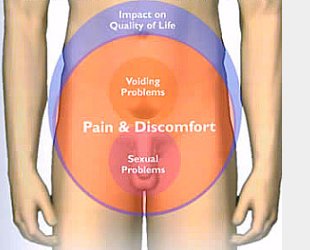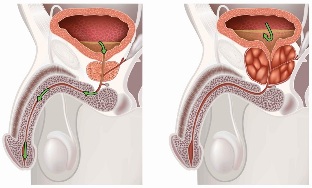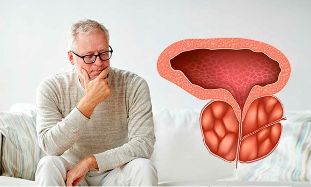Chronic Prostatitis – a prolonged inflammation of the prostate gland, leading to a disturbance of the morphology and function of the prostate gland. Chronic Prostatitis prostate are manifested, the Triassic – pain in the pelvic area and the reproductive organs, disturbances of urination, sexual disorders. Diagnosis of chronic Prostatitis includes Palpation of the gland, the research of the secret of the prostate, sonography, uroflowmetry, in, puncture biopsy of the prostate. In chronic Prostatitis, a comprehensive medical, physiotherapeutic treatment, Massage of the prostate, the posterior urethra, Instillation shown. Surgical treatment suitable in the case of complicated forms of chronic Prostatitis.
Chronic Prostatitis

Chronic Prostatitis is the most common male disease: approximately 50% of men suffers from some Form of inflammation of the prostate gland. Chronic Prostatitis affects men more often at the age of 20 to 40 years, in the period of the highest sexual, reproductive and work. In connection with the detection and treatment of chronic Prostatitis not only medically, but also socially important aspect acquires in urology.
Classification of chronic Prostatitis
To distinguish according to the modern classification of Prostatitis, developed in 1995, 3 categories of disease:
- I. Acute Prostatitis.
- II. Chronic Prostatitis bacterial etiologies.
- III Chronic Prostatitis is not bacterial in origin/the syndrome of chronic pelvic pain syndrome, is not associated with obvious signs of infection and current of 3 and more months.
- III A chronic Prostatitis with the presence of inflammatory component (proof in the secret of the prostate gland leukocytes and pathogens);
- III B chronic Prostatitis with the absence of the inflammatory component (leukocytes and pathogens in the secret of the prostate).
- IV. Asymptomatic chronic Prostatitis (no complaints in the identification of leukocytes in prostatic secret).
In the presence of the infectious component of chronic Prostatitis to talk about bacterial (infectious); in the case of the absence of microbial pathogens – non-bacterial (non-contagione) and Prostatitis. It is believed that in 90-95% of all cases the place non-bacterial chronic Prostatitis, and only 10-5% of the bacterial.
Causes of chronic Prostatitis

Etiology and pathogenesis of chronic bacterial Prostatitis associated with the success of the infection in the prostate gland in the following way: upwards (through the urethra), below (during the casting of infected urine from the bladder), hematogenous (on the highways) or lymphatic (lymph collectors). Often uropathogens Escherichia coli, Klebsiella, Proteus, Staphylococcus, Enterococcus, CORINE, fungal, parasitic and viral pathogens. Together with the non-specific Flora the development of the chronic Prostatitis attend excitation can be accompanied-specific Urethritis (chlamydia, Mycoplasma, gonococcus, Trichomonas, gardnerelly).
However, for the development of chronic Prostatitis is not so important, the presence and activity of micro-organisms, such as the condition of the organs of the small pelvis and the blood circulation in them, the presence of the accompanying diseases, the level of the defence mechanisms.
Therefore, the emergence of chronic Prostatitis is can help, a whole series of factors. Above all, it is urological diseases –Pyelonephritis, cystitis, Urethritis, urethral stricture, increatos etiologist until the end of the acute Prostatitis, Orchitis, Epididymitis, and other Microbial in the prostate injected with the remote foci of infection, e.g. Sinusitis, tonsillitis, dental caries, chronic Bronchitis, pneumonia, pyoderma, caused, etc., Predispose to the chronicity of inflammation, local and General hypothermia, overheating, stay in a humid environment, fatigue, poor diet, infrequent urination, etc.
Non-bacterial chronic Prostatitis is usually associated with congestive (stagnant) phenomena in the prostate gland, from the stasis of blood circulation disorders, venous stasis in the pelvic organs and the violation of the Drainage acini of the prostate. Local obstructio leads to an overload on the blood of the prostate the blood, edema, its incomplete emptying of secretions, which is a violation of the barrier, secretory vessels, the engine, the contractile function of the gland.
Stagnant changes, usually due to behavior-related factors – longer period of sexual Deprivation, practice, canceled or extended sexual intercourse, excessive sexual activity, lack of exercise, prolonged sitting, chronic intoxication (alcohol, nicotine, drugs), occupational hazards (vibration) are connected. To the development of chronic non-bacterial Prostatitis pathology of the pelvis and nerve structures, and its Innervation (e.g., spinal cord injury), adenoma of the prostate, hemorrhoids, constipation, androgen odeficiency and other causes predisposed to it.
Symptoms of chronic Prostatitis
Chronic Prostatitis is manifested by local and General symptoms. On local manifestations of prostatic heard three sound, characterized by pain, dysuria, and loss of libido. Pain in chronic Prostatitis are a constant nagging, localized in the perineum, genitals, the pubic bone, in the groin area. Pain syndrome amplified at the beginning and at the end of urination, this pain radiating to the head of the Penis, the scrotum, sacrum, the rectum. The pain may increase as after sexual intercourse or in connection with the long abstinence; or to grow after the orgasm is dwindling more intense directly at the Moment of ejaculation.
The intensity of pain in chronic Prostatitis varies from thrill to severe discomfort, sleep and health, manifestations. Pain with restricted localization in the sacrum, are often pain as the back or sciatica, in connection with which the Patient can be treated by yourself without the help of a doctor.

Urination in chronic Prostatitis, and learn painful. This celebrated, difficulty at the beginning miscet, weakening or intermittent urinary stream, feeling of incomplete emptying of the bladder, frequent nighttime urinary can urge, burning in the urethra. In the urine in chronic Prostatitis, the filaments can be present floating. After a bowel movement or physical exertion, the secretions appear from the urethra , due to the decrease in the Tonus of the prostate gland. In chronic Prostatitis, the occurrence of itching, feeling cold or excessive sweating in the dam, local discoloration of the skin in connection with the Stagnation of the circulation of the blood to be celebrated.
Chronic Prostatitis accompanied by acute violations of the sexual function. Phenomena gipotenzia can be expressed in the deterioration, pain, erections, longer and more frequent nocturnal erections, difficulty, or early ejaculation, loss of Libido (decreased Libido), deleted, orgasms, Hematospermias, infertility. Sexual disorders can be experienced, it is always difficult for a man, leads to Psycho-emotional disorders, up to neurosis and depression, even more aggravating sexual function.
Exacerbation of chronic Prostatitis, accompanied by a slight increase in body temperature and malaise. The General condition of chronic Prostatitis is characterized by increased irritability, lethargy, anxiety, fatigue, loss of appetite, sleep disturbances, decreased ability to work, creative and physical activity.
Almost a quarter of the patients with chronic Prostatitis symptoms of the disease for a longer time is missing, this leads to a late conversion to the urologist. A long time of chronic Prostatitis impotence can be complicated, vesiculitis, epididymo-orchitis, male infertility, incontinence, and the formation of stones and cysts of the prostate gland, sclerosis of the prostate, is the development of adenoma and cancer of the prostate.
Diagnosis of chronic Prostatitis
For the diagnosis of chronic Prostatitis information you receive with a built-in laboratory and Instrumental examination. Primary investigation for suspected chronic Prostatitis includes the clarification of the medical history and complaints, the conduct of the external examinations of genitals regarding discharge, skin rashes, Irritation, and digital rectal examination of the prostate with the aim of determination of contours, boundaries, consistency, pain in the prostate.
For the determination of the structural and functional changes in the prostate, the implementation of the ultrasonography of the prostate (TRUS). Important methods in the diagnosis of chronic Prostatitis research of the secret of the prostate gland, common urine analysis, bacteriological research of a brush stroke from the urethra and urine, 3 glasses of sample urine, PCR and REEF investigation of scraping on the pathogens of sexual infections, the determination of prostate-specific antigen (PSA).
Clinically relevant in the chronic Prostatitis in the analysis of the detection of pathogens chlamydia, mycoplasmosis, Herpes, cytomegalovirus, Trichomoniasis, gonorrhea, candidiasis, and nonspecific bacterial flora. The fence for the research of the secret of the prostate to the water and the Massage of the prostate. Signs of chronic Prostatitis, the increase in the number of leukocytes in the visual field, the granules reduce the amount of lecithin used, the presence of pathogenic organisms.
In the General analysis of urine at a chronic Prostatitis pyuria, pyuria, èritrocituriâ detected. Bacteriological seeding of the urine enables the identification of the extent and nature of the bacteriuria. In the case of violations of reproductive a study of the seed and MAR-Test.
The extent and the causes of the disturbances in the water can help to determine, urodynamic studies (uroflowmetry, cystometry, profilometry, and electromyography). To distinguish with the help of this research, the chronic Prostatitis, can of the of stress incontinence, neurogenic bladder, etc., In hematuria, Hematospermias, obstructive water endoscopic examination can be shown - Urs, cystoscopy. For the exclusion of the adenoma and cancer of the prostate, the determination of the PSA, in some cases, require the implementation of a biopsy of the prostate with morphologic examination of tissue.

The treatment of chronic Prostatitis
To cure the chronic Prostatitis is not easy, but remember that healing is always possible and largely depends on the setting of the patient, his timeliness of appeal to a specialist, the Definition of compliance with all provisions of the urologist. The basis of the treatment of chronic bacterial Prostatitis, antibiotic therapy is in accordance with antibiotics for a period of at least 2 weeks. To reduce pain and inflammation, NSAIDs are appointed ; to the relaxation of the muscles of the prostate, the restoration of urodynamics and of the outflow of prostate secretion, the uptake of a-adrenoblokatorov.
With the aim of improving the drainage of the prostate, of the local micro-circulation and the muscle tone of the course is therapeutic Massage of the prostate. A Massage of the prostate gland with the release of not less than 4 drops of the secret of the prostate gland. Prostate Massage is contraindicated in acute bacterial Prostatitis, abscess of the prostate, hemorrhoids, stones of the prostate, rectal fissures, hyperplasia, and prostate cancer.
For the relief of pain in chronic Prostatitis can para-prostatic blockages, and acupuncture are recommended. Important in the treatment of chronic Prostatitis relegated to physical therapy with the appointment of the drug, electrophoresis, ultrasound, Phono phoresis, magnetotherapy, laser magneticam illic, inductor meter, mud therapy, CMT, hot sitz baths temperature 40 – 45°C, the inlet hydrogen sulfide and mineral waters, Instillation into the urethra.
In the development of complications associated with chronic Prostatitis, surgical treatment: the removal of strictures of the urethra; TOUR, prostate cancer, prostatectomy, or in the case of the sclerosis of the prostate; transurethral resection of the urinary bladder in the case of the sclerosis on the neck, puncture and Drainage of cysts and abscesses of the prostate; circumcisio in the case of phimosis, caused by recurrent infections of the urinary tract, etc.
Prevention of chronic Prostatitis
Warning of chronic Prostatitis requires the observance of sexual Hygiene, timely treatment of urogenital and extragenital infections, the normalization of the regularity of sexual life, sufficient physical activity, prevention of constipation, the timely emptying of the bladder.
For the exclusion of a relapse of chronic Prostatitis necessary for dynamic studies andrologist (urologist); preventive courses physical treatments, multi-vitamins, immune modulators; exclusion of sub-cooling, overheating, Stress, bad habits.
























